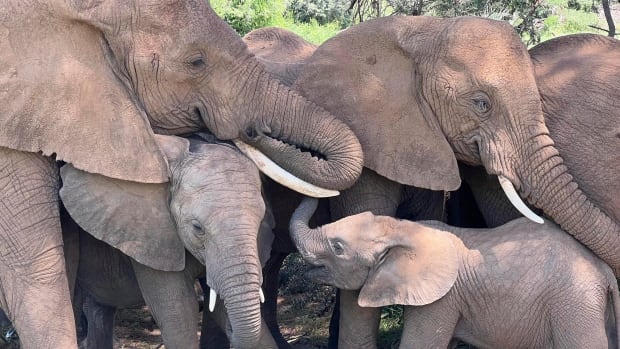As It Happens6:38Elephants may have names for each other that humans can’t understand
Elephants appear to know their own names, according to a new study.
Not the nicknames we humans sometimes give them, but their own, unique elephant names, which they use to call to each other.
The findings, published this week in the journal Nature Ecology and Evolution, bring us one step closer to understanding, and potentially protecting, these complex creatures.
It also puts elephants in a rare category of highly intelligent animals that can address each other with specific monikers — at least, as far as we know.
“It may just be that we haven’t studied enough animals to know how common it is, but there’s very few examples of this in other animals,” study co-author Mickey Pardo, a biologist at Cornell University in Ithaca, N.Y., told As It Happens host Nil Köksal.
Using an AI model to study their vocalizations
Elephants communicate with each other using a wide range of vocalizations, including low-frequency rumbles that they can hear over vast distances.
People who observe them have noticed that sometimes when an elephant makes a noise to a group of other elephants, all of them respond. But other times, when that same elephant makes a similar call, only an individual responds.
That suggests the animals have a way of singling each other out.

To test the theory, scientists gathered vocalizations from more than 100 elephants at the Amboseli National Park and Samburu National Reserve in Kenya, making note of who was calling, and who was responding.
Then they analyzed the audio using artificial intelligence (AI).
“What we were trying to do with that model is to see if we could predict who a call was addressed to just by the sound properties of the call,” said Pardo, who conducted this research as a postdoctoral fellow at Colorado State University.
“Then we would be able to conclude … the calls contain some information that identifies the intended receiver. In other words, a name.”
The AI model correctly identified which elephant was being addressed 28 per cent of the time.
“Which may not seem like that much. But … you have to remember that we don’t expect elephants to use names in every utterance. I mean, humans don’t. Dolphins don’t,” Pardo said. “We had no way of knowing ahead of time which calls might contain a name and which didn’t. So we had to just use all the calls that we had.”
To compare, they gave the model randomly scrambled versions of the elephant recordings to “see how often it guessed correctly by pure dumb luck if it was fed meaningless information.”
It got it right just eight per cent of the time.
“That’s more than a threefold increase,” Pardo said.
To test the theory further, the researchers played audio for 17 elephants to see how they responded to calls that appeared to be addressed to them, versus ones seemingly meant for other elephants.
“We found that the elephants would react more strongly by making more vocalizations, calling back more readily, and approaching the speaker more readily in response to a call that was originally addressed to them,” Pardo said.
“That indicated that they could tell just by hearing a call if it was intended for them.”
Elephant ecologist Chase LaDue, who was not involved in this research, commended the team’s use of machine learning to identify “patterns that we as humans easily overlook.”
“Animals may perceive the world very differently than people do, and so it can be difficult for us to understand what sensory clues are important for animal communication,” LaDue, a postdoctoral fellow in animal behaviour at Oklahoma City Zoo and Botanical Garden, told CBC in an email.
“Machine learning offers the potential to better understand the dynamic nature of communication in elephants and other animals.”
More than mimicry, they ‘form names out of abstraction’
Elephants aren’t the only animals that are known address each other by name. There’s humans, of course, but also parakeets and dolphins.
But with the latter two, the names are a form of mimicry. Dolphins, for example, are believed to have “signature whistles” they use to announce and identify themselves. Other dolphins sometimes mimic those whistles to get a particular dolphin’s attention.
Not so with elephants.
“We found that there’s no evidence that elephants are imitating the calls of the receiver,” Pardo.
So where do elephant names come from?
“We hypothesize that they may get them from their mothers — but that that’s just a hypothesis now,” Pardo said.
LaDue says “the apparent ability of elephants to form names out of abstraction” is impressive.
“We understand that elephants are intelligent,” he said. “But these findings open a whole new line of research inquiry into the inner workings of elephant minds.”
Elephants are so smart, in fact, that they can often find ways to bypass whatever barriers humans put up to keep them from wandering outside of protected areas and into spaces where they’re likely to come into conflict with people.
Understanding their vocalizations, he says, could pave the way to better conservation strategies for the endangered species — for example, using certain sounds to warn them away from some places, and other sounds draw them elsewhere.
But there’s still a lot scientists don’t know about elephants’ names, Pardo said — including what they even are.
“We still haven’t been able to figure out exactly what part of the call contains the name,” he said. “If we could isolate the names of specific individuals, that would open up a whole bunch of other questions that we could address.”
For example: how do elephants get their names? In which contexts do they use them? Do they ever talk about someone in the third person when they’re not there?
“All of those questions would be much easier to address, and maybe could only be addressed, if we could isolate the names for specific individuals. So I think that’s probably the next step in this research,” Pardo said.







